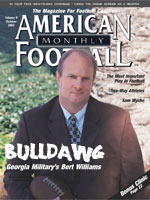AMERICAN FOOTBALL MONTHLY THE #1 RESOURCE FOR FOOTBALL COACHES
Article CategoriesAFM Magazine
|
ThrowbackGeorgia Military College\'s Bert Williams uses bulldog tenacity to take a bite out of the JUCO eliteby: David Purdum © More from this issue Attention all coaches: Think conditions are tough where you are? Try taking a group of talented, but often-immature, teenagers and transforming them into not only Division-I football players, but also into NCAA-caliber students. Oh by the way, you have only two years to do it. Seems like an impossible mission – for the average coach. Luckily for 24 Georgia Military Bulldogs, who, in the last three years, have made the leap from the junior college located in Milledgeville, Ga., to an NCAA Division-I program, Bert Williams is not an average coach. Bert Williams is an old-school disciplinarian and a difference-maker on and off the field. “I love the feeling of being able to make a difference in a kid’s life while he’s here,” said Wil....The full article can only be seen by subscribers. Subscribe today!
|
|
|||||||
| HOME |
MAGAZINE |
SUBSCRIBE | ONLINE COLUMNISTS | COACHING VIDEOS |
Copyright 2026, AmericanFootballMonthly.com
All Rights Reserved





